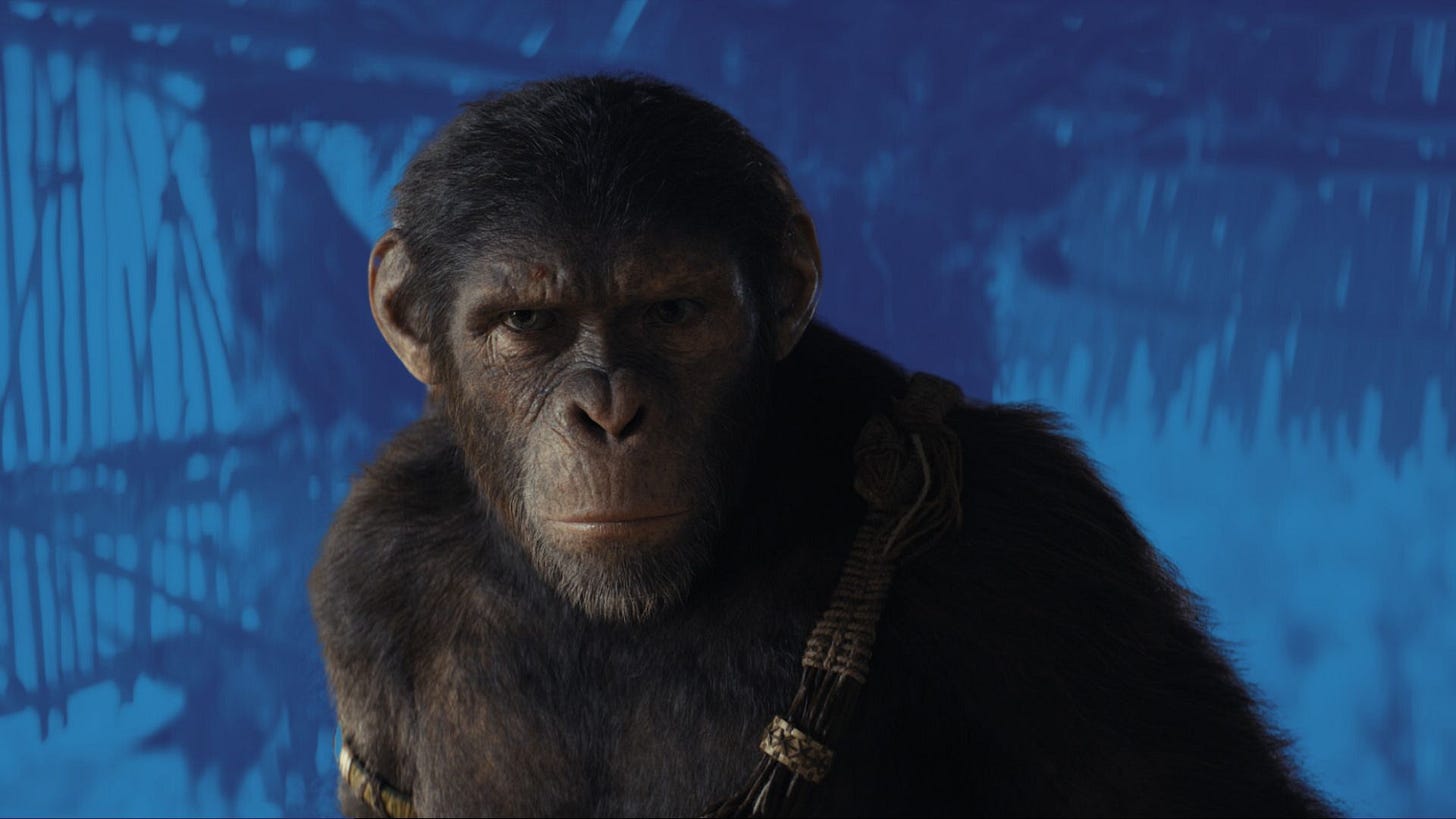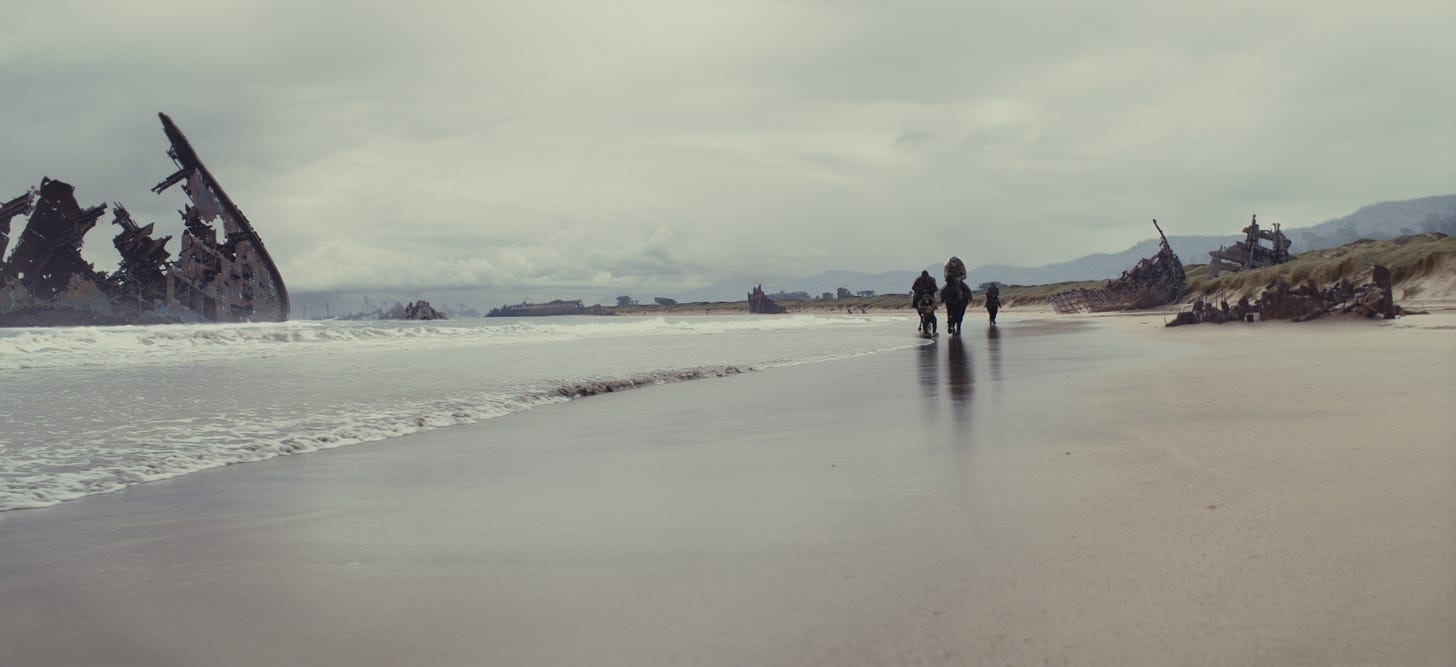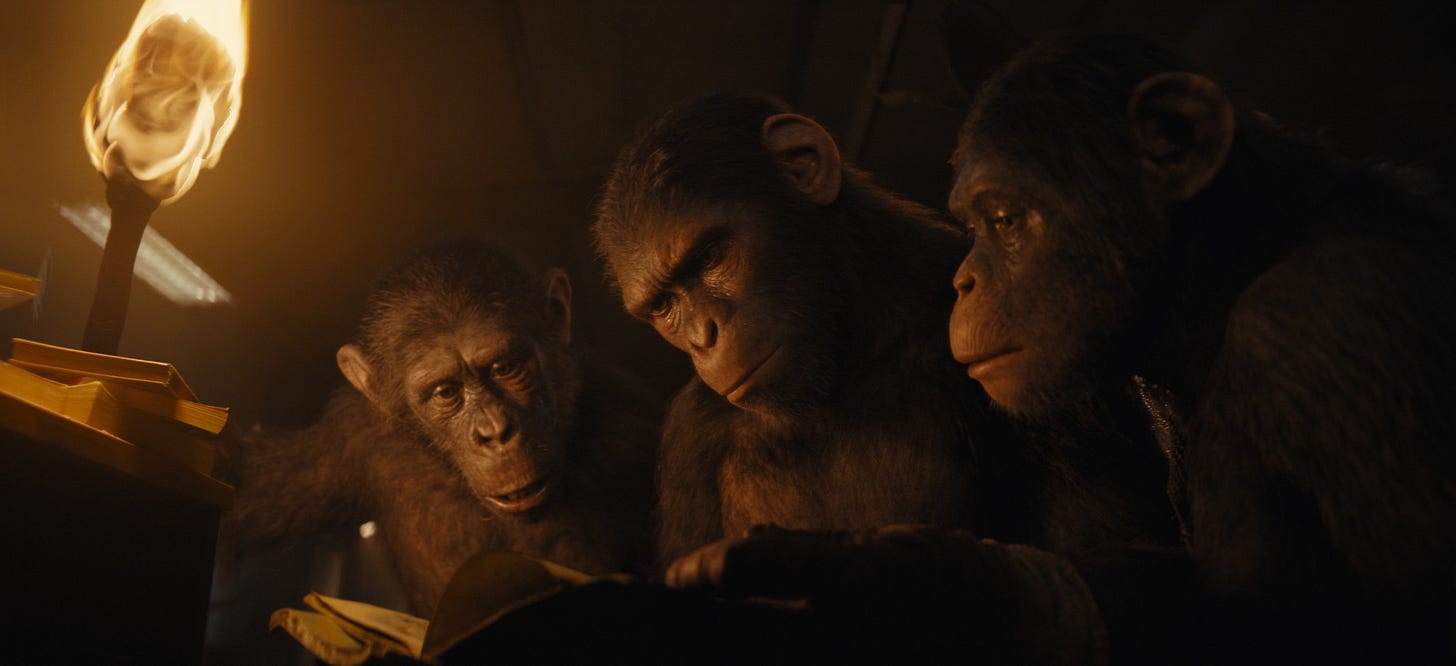Kingdom of the Planet of the Apes
How kingdoms honor (or dishonor) their god.

After a seven year hiatus, the “Planet of the Apes” franchise returned this year with the tenth film in the series, Kingdom of the Planet of the Apes. The recent trilogy of prequel films (Rise of the Planet of the Apes, Dawn of the Planet of the Apes, War for the Planet of the Apes) followed Caesar, the first hyper-intelligent ape, as he lead his species on an exodus from human treachery and bondage.
But now, several generations after Caesar’s Christlike life and death, director Wes Ball’s new entry in the series provides audiences with a reflective (and frankly, spiritual) look into a world where the apes have fully emerged as the dominant species and Caesar’s powerful legacy looms large. With Caesar having advanced and freed the apes, how do they honor that legacy? Do they move past him? Live out the compassion that he showed? Organize power in his name?
Or, as Theologian N.T. Wright puts it, “How do we build for the kingdom [of God] in the face of menacing empires while resisting the inevitable seduction to create an empire of our own?” Kingdom of the Planet of the Apes follows the apes’ various attempts to “build for the kingdom,” investigating how religion can shape kingdoms for better or for worse and how those choices may come to define the future.

“TOO MANY HAVE FORGOTTEN HIM”
Noa, the film’s protagonist, grows up in an ape village that seems to have all but forgotten Caesar. He may be vaguely aware of the name, but Caesar’s legacy has little impact on Noa’s life or surroundings. The village’s leaders seem content with this life, with Noa later ruminating “They did not tell us [about Caesar] because they did not know. They did not want to know (this is a striking similarity to a theme I noticed in Judgement at Nuremberg, bearing notes of Romans 1:18).”
After a tragic event early in the film leaves Noa separated from his family and friends, he accepts the hero’s call, setting out on a journey to find and save them from a new tyrannical ape leader, making choices that will define a future for apes and humans alike (20th Century Studios).
Early in his journey Noa meets Raka, a wise orangutan who quickly begins to serve as his voice of conscience. “Show mercy,” Raka urges, encouraging Noa to give his coat to a cold human. “Humans were important to Caesar, so they are important to me.” Peter Macon’s portrayal of Raka immediately endears viewers to the character. His warm humor and quiet wisdom shine effortlessly through the motion capture (a continued high spot for this series), while John Paesano’s rising and falling piano melody reverently reminds us of Caesar each time Raka speaks about his “decency, morality, strength, and compassion.”
It’s here we start to see Noa’s entire worldview begin to change. Owen Teague masterfully uses his eyes and microexpressions to express Noa’s wonderment and confusion at these revelations. His isolated lifestyle has protected him from many dangers in the world, but it has also prevented him from knowing the reason for the apes’ salvation: Caesar.
Freya Allen masterfully portrays Mae, the aforementioned human that Noa and Raka aid and the sole leading ‘human’ character in the film. She accompanies Noa on his journey to save his village from the tyrannical ape leader, Proximus, and (without giving away too much) carries her own motivations for seeking out this kingdom. This is a different human character than the ones we’ve followed in past films, living a life of suppression and isolation since the apes now rule as the dominant species.
Mae’s role showcases another impressive feat of technology, seamlessly blending human and motion capture characters in a jaw-dropping manner. Mae doesn’t just communicate with the characters but physically interacts with them, riding on their backs, fighting with them, and more. It’s an easy thing to take for granted four films into this prequel series, but the ease with which the filmmakers manage to combine practical and digital elements never fails to astound.
“NOW I AM CAESAR”
Finally arriving at the “kingdom” they sought, Noa and Mae encounter Proximus, the self-proclaimed ape king who imprisons humans and apes alike in an effort to find tools that can evolve his species...all in the name of Caesar.
Proximus’ fascinating introductory scene blends elements of a sermon and a political rally, quoting Caesar’s words like scripture while mixing in his own plans for action (“As Caesar wanted. As Caesar required,” he boasts to the crowd). Kevin Durand’s commanding performance as Proximus takes center stage even amidst the deafening sound mix of the adoring crowd, with the edit alternating between closeups of his imposing demeanor and wide shots showing the crazed excitement of the apes.
Fun fact: the name for a political system that has one person serving as both head of the state and the head of the church is ‘Caesaropapism.’ Proximus has made himself both god and king of the apes as he proclaims to his followers, “Now I am Caesar.”
If acts one and two of the film were a slow re-immersion into this world and its new power dynamics, act three is a figurative (and literal) bursting of the dam as Noa’s, Mae’s, and Proximus’ plans and ideologies come into full conflict with each other. Wes Ball places his Maze Runner action chops front and center with a skillful blend of shaky cam and steady wide shots in a propulsive edit from Dan Zimmerman and Dirk Westervelt.
But what makes act three truly exciting isn’t just Ball’s eye for action and suspense, but the clash of principles between the main characters. Each makes a compelling case for why their plan for the future is the best one, and while some choices are clearly better than others, what makes the film’s finale so exciting is that any character could triumph, and we aren’t quite sure which outcome would be best.

“REMEMBER WHO HE WAS”
Much like the audience, Noa has no easy answers to the film’s conflict, constantly grappling with the life and teachings of Caesar and how his legacy continues to impact the divided society of apes and humans.
“You are different,” Noa’s mother says to him curiously towards the end of the film. And it’s true. Everyone in the film that learns the truth of Caesar cannot help but be changed by his story. Raka honors Caesar’s memory by living with compassion for others. Proximus “takes [Caesar’s] name, twists his words.” What will Noa do?
Noa may be uncertain of how ape society should function and whether humans and apes can ever truly coexist as equals. But he’s a changed man (ape?) on the inside. He finally knows who Caesar was, and, wearing a necklace with Caesar’s symbol, he is finally committed to “follow Caesar’s word [and] remember who he was.”
As a Christian, it’s easy to find myself facing the same internal struggles as Noa. How should I advance God’s kingdom in response to the knowledge of what Christ has done? Much like Noa realizes about Caesar in the film, the answer lies in obeying Christ’s words. By feeding the hungry, welcoming the stranger, caring for the sick and imprisoned. By proclaiming his works to the entire world.
How Kingdom of the Planet of the Apes fits into the grander scheme of the franchise remains uncertain. Will we see these characters again, or was this the end of their journey? Regardless of future entries in the series, this film serves as a strong continuation of the prequel series’ legacy and, on a personal note, a pressing commission for Christians to help build and honor God’s kingdom.
“Now the kingdom of this world belongs to our Lord and to his Chosen One! And he will rule forever and ever!”
- Revelation 11:15

